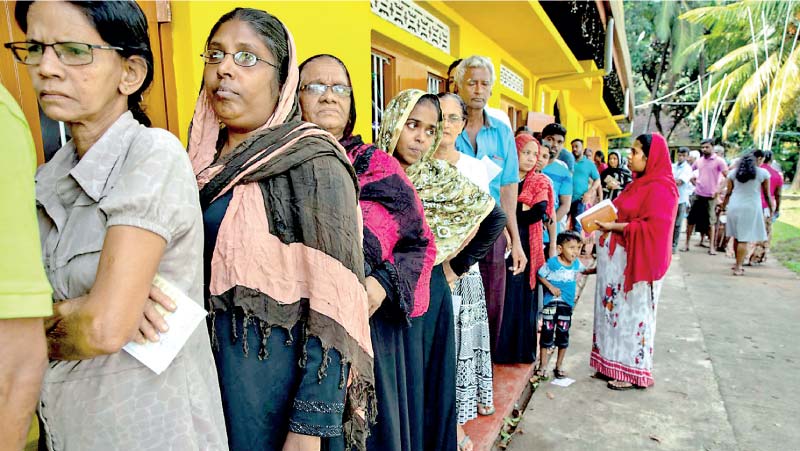Saturday Feb 21, 2026
Saturday Feb 21, 2026
Monday, 11 November 2024 01:26 - - {{hitsCtrl.values.hits}}

Eastern Muslim voters are increasingly moving away from racial and ethno-centric politics
 The Presidential Election 2024 has shown a dramatic shift in the voting behaviour of Muslim voters in the Eastern Province. A long struggle for an alternative political force of the Muslims has finally gained significant behavioural change in areas traditionally led by established political figures. These results reflect a departure from conventional voting patterns, emphasising a strong desire for a change among Muslim voters in Eastern Province, who are increasingly drawn to progressive and inclusive approaches.
The Presidential Election 2024 has shown a dramatic shift in the voting behaviour of Muslim voters in the Eastern Province. A long struggle for an alternative political force of the Muslims has finally gained significant behavioural change in areas traditionally led by established political figures. These results reflect a departure from conventional voting patterns, emphasising a strong desire for a change among Muslim voters in Eastern Province, who are increasingly drawn to progressive and inclusive approaches.
Withdrawal of prominent figures such as Ali Zahir Maulana and Hafiz Naseer of Batticaloa and H.M.M. Harees of Ampara from the race, who previously exercised considerable influence over eastern Muslim voters created a vacuum in the region’s political landscape. It allowed new candidates to rise to prominence. It is considered as a strategic move of NPP by using this behavioural change as an opportunity and chose their candidates on fit-for-purpose basis by bringing attractive figures into candidacy limelight.
The behavioural indicators including recent public opinion surveys, social media analyses, and live polls indicate that support for the new candidates in the province has risen significantly in the ongoing general election campaigns. This noteworthy increase advocates that voters in the region are increasingly embracing the change from traditional affiliations. Those who voted to traditional parties in the Presidential election also changed their stances in favour to the new faces.
The weakened policies and disappointing past of other parties and their familiar candidates, such as Hizbullah (SLMC) from Kattankudy and Ameer Ali (SJB) from Kalkudah, Athaullah (NC) from Ampara have further contributed to this shift in voter sentiment and underscores a radical shift in voter priorities from individual-centric politics towards policy-based approach particularly appealing to younger voters.
Below are few factors contributing to this political realignment:
1. Demand for accountability: In recent years, eastern Muslim voters have grown frustrated with the unfulfilled promises of traditional leaders and their lacks of sustainability in development and political policies. They demand an approach that contrasts sharply with traditional political system focused only on charisma or legacy.
2. A call for inclusive representation: Eastern Muslims are increasingly disillusioned with traditional leaders focused on personal influence over inclusive and people-driven benefits. This approach has left younger voters into exhaustion. This shift reflects a strong desire for representation that genuinely addresses the aspirations of all community members promoting unity over separatism.
3. Appeal of progressive policies: The younger generation of eastern Muslim voters now strongly supports progressive policies focused on youth empowerment, equal opportunities, and inclusive development. The wave of anti-corruption sentiments and boasting fairness that echoes in the new campaigns has become a beacon for voters particularly youngsters.
4. Moving away from ethno-centric politics: Eastern Muslim voters are increasingly moving away from racial and ethno-centric politics. They are seeking inclusive representation that addresses broader community needs. The SLMC, which was once a dominating power for its ethno-centric approaches that played a divisive role in the regions political shallow, is now viewed as a narrow approach on communal interests over collective social and economic issues of the country. This shift reflects a growing demand for leadership that transcends ethnic lines, focusing on collective progress and tackling issues impacting the community as whole. It is also noteworthy that the leader of SLMC, Rauff Hakeem spoke about his retirement from politics, signalling the early notice of potential rejection of such.
This election may well be remembered as the beginning of a transformative journey for eastern Muslim voters, rooted in a desire for accountability, development, effective governance and new change in their political presence.
(The writer is a published political writer and legal consultant, holding LLB (Hons) and MBA from UK, currently based in Sri Lanka.)